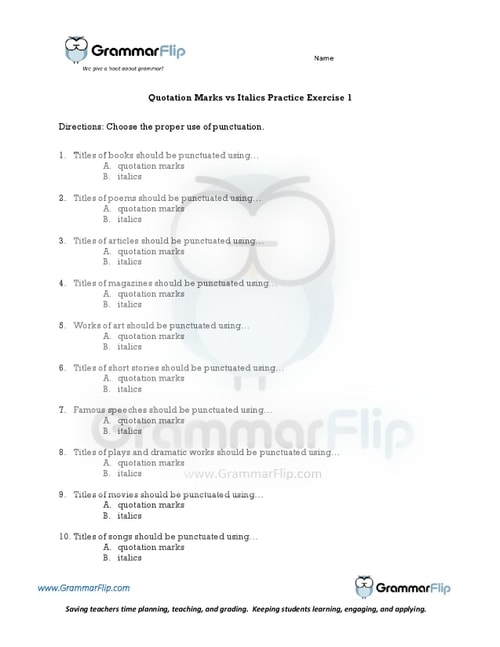When Do You Use Quotation Marks vs. Italics?
Quotation marks, a type of punctuation mark, are used to set apart titles of shorter works such as short stories, poems, songs, articles, and famous speeches. Italics, a typesetting in which letters slant to the right, are used to set apart titles of longer works such as books, movies, magazines, plays, and works of art.
Some examples of when to use quotation marks vs. italics would be the following:
When to Use Quotation Marks
Short Story: “Bartleby, the Scrivener” by Herman Melville
Poem: “The Raven” by Edgar Allen Poe
Song: “Smells Like Teen Spirit” by Nirvana
Speech: “Give Me Liberty or Give Me Death!” by Patrick Henry
When to Use Italics
Book: The Grapes of Wrath by John Steinbeck
Movie: Citizen Kane
Magazine: Forbes
Play: Othello by William Shakespeare
Painting: The Scream by Edvard Munch
Now that you’re familiar with quotation marks, be sure you know how to use quotation marks in dialogue as well!
Long-Form Video: Quotation Marks vs. Italics
Long-form instructional video lessons allow students to engage with grammar concepts in more depth and detail.
This format provides students with a stronger foundation and a more comprehensive understanding of when to use quotation marks vs. italics.
Download a Free Worksheet on Quotation Marks vs. Italics!
Click the image below to download your free worksheet on quotation marks vs. italics!

Need something more than just worksheets for your grammar instruction?
Explore More GrammarFlip Lessons!
Parts of Speech lessons provide the building blocks of grammar. GrammarFlip covers these topics in detail to ensure a solid foundation is built. First time learners and students seeking to review the parts of speech can both benefit from the instructional videos and slide show reviews.
Parts of the Sentence lessons are critical for understanding how the parts of speech function in language construction. From the basic to the advanced, these lessons will cover a wide range of grammar topics that can be used in any grade level or classroom.
Mechanics and Usage lessons equip students with the necessary skills to communicate clearly to all audiences. With a focus on the application of these concepts in student writing, these lessons tie together both simple constructions of grammar as well as the more complex such that any age or skill level of student will benefit.

